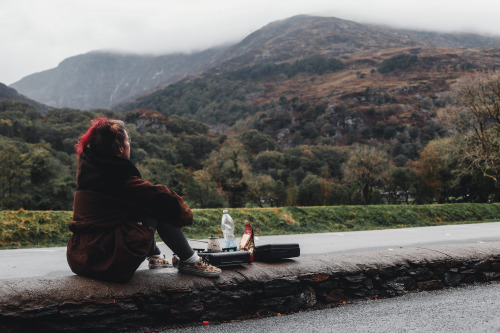#travel writing


The Norse Mill and Kiln at Shawbost, Outer Hebrides, UK




Dream cottages in Scotland, UK

Harris is one of the best places in Scotland to see golden eagles, and I was on high alert, yelling “EAGLE!” and pointing wildly into the sky several times a day, often at a seagull. M is a very patient person. We saw only soaring buzzards and a helicopter on the spectacular coast road to Tarbert, though the helicopter kept landing on a fishing vessel and carrying a full barrel of something up into the hills, which was very exciting. Initially we thought we’d busted a drugs smuggling ring with a James Bond mountain lair, but we now think it was salmon restocking.
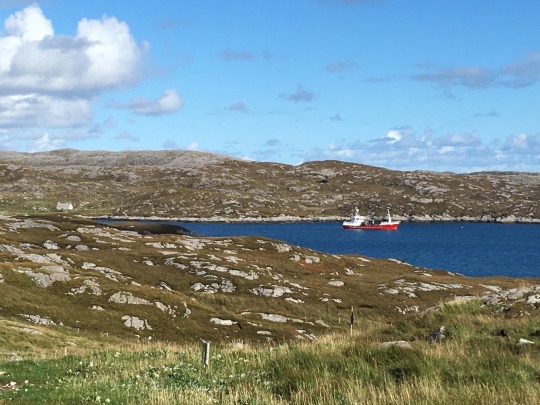
In Tarbert we picked up the binoculars we had each ordered in, plus some brake parts for M’s bike that had got corroded from all the bracing sea air. We refuelled with an enormous burger each near the Harris Gin distillery, and then set off on the road to Scalpay (a bonus extra island). The road swept down across a bog and then up and over the headland above Tarbert. We crossed the tall concrete bridge onto Scalpay and could see Skye’s Cuillin Ridge once again.
Just before the village was a sign declaring HOME BAKING, and in an honesty box were piles of delicious things. The baker herself, cheerful Riona, was just emptying the box for the evening but let us buy some millionaire shortbread. We were cheerfully describing the measly dinner we were about to make ourselves (“couscous again!”) when she went inside to get us some fresh eggs, refusing payment but requesting the pink egg carton back in the morning.
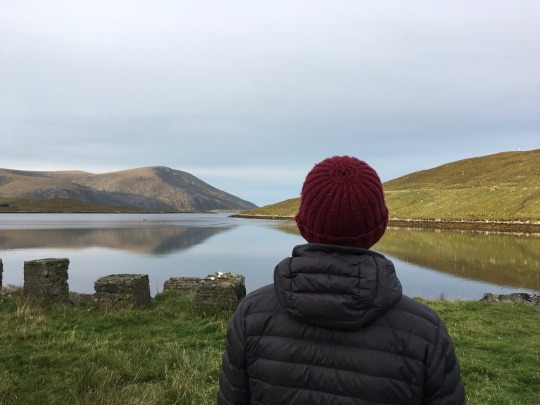

We went on to Eilean Glas Lighthouse, down a gravel track that bounced through the boggy ground. The red-and-white striped top showed over the last hill and then we could see the lighthouse in all its glory, with some old cottages for the keepers at its base and a fantastic rusty foghorn sticking out into the Minch. Just before it was a bothy, and lo and behold the door was unlocked. It was very basic, with just a wooden floor and a picnic bench – no electricity or running water – but it was shelter. We cooked up the eggs as the sky turned pink and the lighthouse began to flash its gentle warning into the darkening sea.
We retraced our steps in the morning and were just rising out of the bog when I saw the eagle – which was actually an eagle this time. It was a white-tailed eagle being mobbed by a tiny speck of a crow. It flew fast and low on its barn door wings, then twisted away so we saw its distinct white bum. It flew miles off but we managed to keep it in our sights and watched it soar over the tops of the Harris hills.

We dragged ourselves back over them in turn, through a brutal headwind and an icy hailstorm, and then cycled along the longest 2km of gravel ever to the North Harris Eagle Observatory. It was hidden deep in the recess of a valley, beside a silvery slip of river. We’d not even got through the door when a golden eagle came shooting over the top of the valley wall and sailed on the thermals in the tawny glow of sundown. We saw it again a little later, dark against a darkening sky, and then it was gone to its eyrie and us to ours.
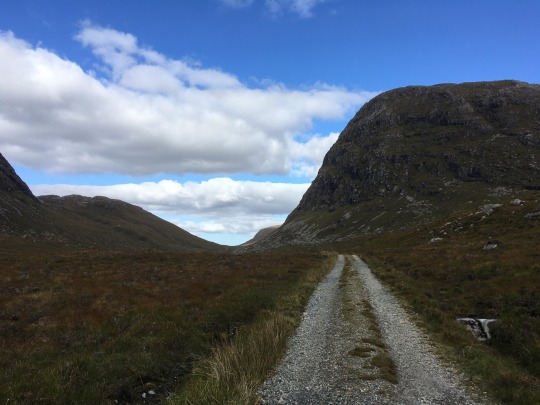
Read the next Island Hopping blog: To the end of the rainbow




Eilean Glas Lighthouse. Isle of Scalpay, UK

The Outer Hebrides are the last bastion of Sabbath observation in Scotland. As we cycled up from the southern cluster of islands, crossing onto Grimsay (island six of ten) and then North Uist (island seven), the dominant faith changed from Catholicism to the Calvinistic Free Church, who take the Sabbath very seriously.
Not a single shop, bakery or restaurant was open as we cycled through the last of the sea fret, which swirled around the mirror-smooth surface of the water. All the traffic was people in their Sunday best, making their way to church. No washing hung out to dry and no children played. Rumours still abound that people tie up playground swings to stop them being used.

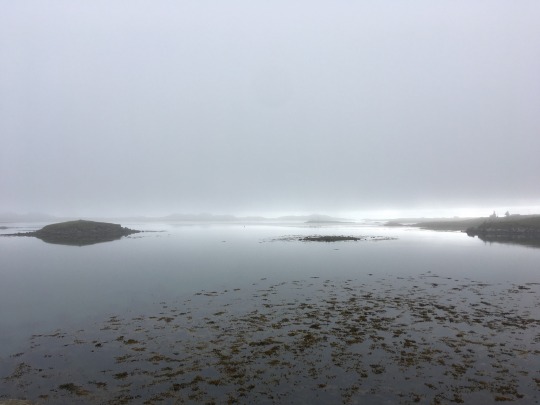
We reached The Tractor Shed, accommodation in an adorable little wooden hut for two nights, which luckily was open. Storytelling Yorkshireman Duncan was our host. We settled in with a cup of tea and he told us about Hercules the trained grizzly bear, who was shipped over to the Outer Hebrides for a Kleenex advert in 1980 and went rogue (“he’d been watching too many nature documentaries”). He was on the run for 24 days before turning up, half starved, near someone’s croft. “Catching salmon is harder than it looks,” said Duncan.
Under the eaves of our hut was a deck and a little burner. M got a peat fire going in the evening light and we huddled around it as a legitimate hoolie began to blow. The wind howled all night and all of the next day. Two sets of frozen cycle tourists turned up, the first we’d seen going our way since we got off the ferry on Barra, and we swapped stories in the kitchen.

When it came our turn to leave, the wind was still whipping. At first it was a vicious, bullying crosswind, trying to shove us into the sinking peat bogs beside the road. Pouring rain came for good measure, and then the wind turned completely so we were pushing against it like it was solid. Every time I thought we were going to crest a hill and see the causeway to Berneray (island eight) laid out for us, there was yet another hill to be crested.
Finally we could see the grey water and the orange display board saying the ferries were all cancelled for the day. The tiny terminal had nothing but a hard wooden bench, but at least it was indoors. We took our waterproofs off to drip-dry and watched the energy-generating windmill outside trying to wrench from its concrete foundations, spinning so fast it was a blur.
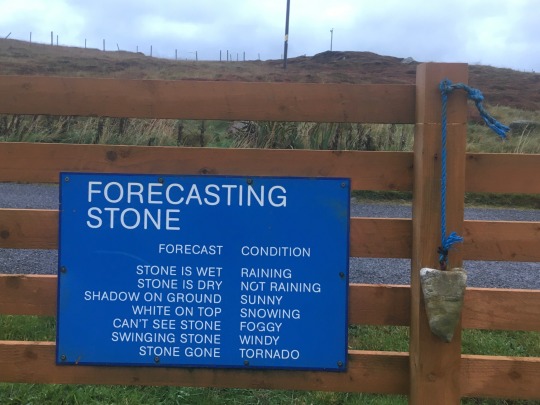
Berneray’s little shop and bistro was just around the corner, so we braved it on foot to get some hot food. In the carpark was a Forecasting Stone. STONE IS WET: RAINING said the sign. SWINGING STONE: WINDY. STONE GONE: TORNADO. It didn’t feel far off.
The storm blew itself out and dawn came blue and gold and gorgeous. Just after sunrise we got on the ferry to Leverburgh. In 2006 this crossing had invoked fury amongst the islanders, and even a legal challenge, when operators CalMac added a Sunday sailing. An article from the time describes the ferry docking to posters that read “Remember the Sabbath Day to keep it Holy” but no protesters – that would have broken the Sabbath. There was no welcoming committee for us on Harris either (island nine!) but there was sunshine, which I would take any day.


Read the next Island Hopping blog: Hunting eagles on Harris
I remember this moment well. Not one week into our third roadtrip, still giddy with the highs of freedom, we had just entered the French Alps. It was our plan to cross the length of the Alps in their 1,200km entirety, a feat we were not sure had been accomplished yet by road.
Except our van was beginning to make some worryingly loud noises as we decelerated down a hill, and we rolled into the town of Briançon with our first bout of breakdown anxiety.
It was here in the confines of a LIDL carpark that we identified a propshaft issue, but, unable to find a French mechanic who was willing to work on a weekend, we pressed on.
We spent a chilly but scenic night at just shy of 2,000m high on the shores of Lac du Mont-Cenis then pushed on toward Italy in the morning. Shortly after crossing the border however, the noise was now a permanent feature and a growing concern, until finally we pulled over and phoned for a recovery truck outside an Italian cafe. We spent five hours here waiting for rescue, drinking espresso, chatting with the locals in my best Italian, then finally succumbing to boredom and heat fatigue as we baked in the sun at the roadside.
After a good long while we were taken down the mountain on the back of a tow truck and it was just like the good old days, as though we’d never left the continent in our (t)rusty LDV. We were offered a hotel and help with the repair bill by our breakdown company, but I insisted we stay with the van. Much to everyone else’s chagrin we three spent a cold, miserable night confined to our quarters in the garage courtyard, dreaming of the hot shower and comfy bed we could’ve had.
But I knew I was right in my decision, and if three years of travelling thus far had taught me anything it was this: the van was our comfort, our safety, our home. When she stops we stop, and where she goes we go.
~ This image was created as part of our “Transient” travelogue project. ~ Stepping away from the Instagram frivolities and fakery, “Transient” serves as a close and intimate portrayal of our lives in an attempt to remove the romanticism of travel and capture a raw and honest self-documentary inspired by the images and stories of the new age travellers of 1980’s Britain.You can view the full project and others over on our website lbjournals.com.
Post link
Brewing up Turkish coffee in the Welsh mountains on a stormy day- the perfect antidote to a sleepless night.
Perhaps we should’ve expected the inevitably wet British weather on our camping trip to Snowdonia, but not knowing what to expect was all part of the fun. We’d spent a rather long time trying to find a suitable camp spot that day, eventually settling in a small, untouched patch of pine forest that had not yet been logged unlike its surroundings.
We busied ourselves pitching the tent, lighting a fire and preparing some dinner, and it was only once we had just finished setting up camp that the heavens opened. As our campsite quickly flooded with rain and the fire crackled and hissed, struggling to stay alight, Ben and I frantically began lashing a tarp to the surrounding trees, cutting pieces of cord with an old hunting knife and tying them to whatever branches we could find as rain streamed down our faces and up my sleeves.
You’d think this would’ve been the last straw at the end of a challenging day, but somehow as we sat eating fajitas in the car by the light of the fire that glowed beneath our newly constructed shelter, we caught eachother’s eyes and couldn’t stop giggling. Sure we were wet and cold, our tent was damp and our socks were soaked, but we were having fun nonetheless. We were out here alone, not another human in sight, just battling with the elements and keeping each other company.
The fondest memories we make aren’t always of the best times, and even the best-laid plans often go awry, but we embrace every moment of freedom we can find. Where adventure waits, there lies challenge, and we are prepared to follow.
Post link

Another day of life in the wild.⠀
One of our last few days in Bosnia, spent amongst snow and pine, sprucing up before our big journey home-bound. We’d be returning worn out and penniless, with a broken van and a clutch of precious new memories, yet we did not regret a single moment of the last six months.
It’s a taboo subject to talk about money, but we left for this trip with just a few grand between us. For six months of living and travelling over 15,000 miles- that’s not a lot.
And so to anyone who says that we are privileged: you’re wrong. Our lifestyle is not a privilege, it is the product of hard work, ruthless saving and months of rigorous planning. All in the name of following our dreams, all in hope that someday we might be able to make the money to sustain doing what we love. All for that little taste of freedom.
And it was worth every freezing night, every stale loaf of bread, every skipped meal, every dinner scraped together out of leftovers, every push to get to the next fuel station and every questionable road. We have not lived well but boy have we lived.
We’ve driven spectacular roads, spent evenings in the company of welcoming locals, sampled cuisines and cultures from all walks of life, been to unbelievably remote locations and captured it all through the glass of a lens.
See we’re not just doing this for a jolly, to escape the 9-5; we’re doing this because we have a passion and the tenacity to chase our dreams. We sacrificed comfort and security for the promise of something so much bigger.⠀
You don’t have to be rich to travel; we’re proof of that. All you need is a dream, and the desire to chase that dream.⠀

Our van wheels crunched over unpaved road after unpaved road, kicking up mud and gravel as we bumbled along a series of winding dirt tracks which wove their way through endless pine forest.
This was the face of Bosnia & Herzegovina’s interior, a world away from the bustle and bullet-strewn concrete structures of its capital Sarajevo. Here, pretty little stone houses were strewn across scenic plateaus which seemed to appear mysteriously out of the dense thicket of trees that surrounded them and crept up to their doorsteps. Wild animals were known to roam these forests, and we wondered how humans could live so close to them without conflict.
We were still carving our route home out, ever Northbound, savouring these last few days in the Balkans before we would hotfoot across Europe back to England. We slept soundly that night, cradled by the forest, and coaxed our van into life with jackets bundled against the icy morning air. This was our pattern of travel these days; squeezing the most of every moment, battling with our van to get it home, the road our only constant as we went.⠀
As the forest dwindled and eventually gave way to civilisation we followed a winding little road partially covered by snow up to a ledge, where we spent the night sleeping underneath the remnants of Tito’s fist. Now a crumbling concrete structure, this bizarre object known as a spomenik had once been a monument to the Partisan soldiers who fought in the Battle of the Wounded in the valley below, but was nicknamed for its uncanny resemblance to Yugoslavia’s former leader ad the iron fist with which he ruled. However, shortly after the Bosnian War, a group of vandals planted dynamite inside and blew it to pieces, although its skeleton still dominates the skyline for miles around.
We were beginning to understand more of Bosnia’s chequered past, evident in every bullet-strewn building and every crumbling ruin we passed. Twenty years was not enough time to heal, but even after the visible reminders had long since been repaired, the memories would not fade for generations yet to come.⠀
⠀
Driving through the snow-covered mountains which encircled Sarajevo, it was hard to imagine this beautiful area as a war zone, even less so one that had existed in our lifetimes. Yet the scars leftover from the war were omnipresent; they were in every bullet hole-strewn building, in every road surface struck by a mortar, in every man who hobbled past us on wooden crutches. We had arrived in Bosnia & Herzegovina with the intention of seeing beyond its past, but found it quite impossible to ignore.
Perhaps most poignant of all the lingering remnants of war were Sarajevo’s abandoned Olympic venues; the bobsleigh track once filled with spectators, now a crumbling relic; the angular lump of concrete that was Hotel Igman, whose rooms had not been filled since the siege began. Most chilling of all perhaps, were the former Olympic ski jumps, located on the buffer zone across Igman ridge, laced with mines and used as a site for executions.
As our boots crunched through deep snow only the eerie silence in the air betrayed the area’s dark history. We’d spent the night at Hotel Igman, although not as its designers had intended; we’d camped up in what would’ve been its car park, or so we had presumed as it was buried under a foot or so of snow. Having woken up to find the bobsleigh track and surrounding pine trees painted white the previous morning, it gave us an enormous sense of comfort that the mountains on the opposite side of Sarajevo were also covered. This would be the last snow we’d see for many months, dusting the communist concrete structures and turning them into things of beauty, the snow and infinite forest of pine trees muffling all sounds as we slept beneath a blanket of white.
But now the snow was melting, icicles dripping all around us and soaking into our boots as we explored the remnants of Sarajevo’s ski jumps. It seemed metaphorical almost of our time in the Balkans; simplistically beautiful, all too brief and now slowly coming to an end.
We had just a few more days in Bosnia before our compass would point us North, and we would make our reluctant return into Western civilisation.
Post link

Our arrival in Bosnia & Herzegovina came as a pleasant surprise.⠀
After following the craggy walls of the mighty Tara Canyon all the way through Montenegro it led us straight into the capital city of Sarajevo. We weren’t here to see the war ruins, nor had we come to try and find the best burek (although that was debatable). No, with just seven short days in this intriguing country that was once one of the most fundamental parts of the Yugoslav Republic, there was only time to explore one thing: the remains of Sarajevo’s Winter Olympics venues.
We pulled up after a long day of inter-country driving, arranging of SIM cards and fawning over foreign foods in a new supermarket, next to a long, snaking and heavily graffitied piece of concrete. We’d seen photos of the abandoned bobsleigh track online but never for one minute did we imagine we could drive into it, let alone camp. The place was perfectly secluded amongst the pine trees, at the top of a mountain which gave a spectacular view over the city. As night fell we rested underneath the Sarajevan sky now studded with stars.
Come morning we noticed a distinct chill in the air, and threw open the door to discover a blanket of snow all around us. We’d had no inkling snow was coming, and had been lamenting the day before how incredible it would’ve been to see the bobsleigh track as it was during the 1984 Winter Olympics.⠀
We bundled on our boots in pure excitement and piled out of the van to make tracks in the fresh, untrodden snow and explore the lengths of the snaking concrete track which wound its way in and out of the pine forest. At times we were completely hidden by trees, shrouded in fog, appearing at regular intervals in view of a road or a place where spectators would’ve gathered in years gone by before the war changed the face of Sarajevo forever.
Fingers suitably numbed, we headed back into the van to warm them with coffee.

Deep canyon walls rose high either side of us as we followed alongside the raging blue river, weaving in and out of craggy rocks and diving through tunnels carved out of the very mountainside itself.
After six short weeks in Albania, which felt like it had lasted both like a lifetime and the blink of an eye, we were now driving North through the Tara Canyon, one of Montenegro’s most impressive natural wonders and the deepest canyon in Europe.
Our journey had begun that morning after an exceptionally rainy day in Albania, and as we waited for the diggers to clear the landslides that blocked the road we were questioning whether we had to leave at all or if we could stay here forever. Our second time in Albania had been just as incredible as the first, and we left with a deeper understanding of the country as well as a handful of new friends.
The border crossing into Montenegro was no more than a remote outpost, lacking in electricity or internet; they wrote down our details by hand, stamped our passports, shouted out the letters “L- D- V!” then a burly uniformed man lifted the barrier by hand and we drove beneath it onto Montenegrin soil.
The sides of Tara Canyon soared up to 1300m above us, higher than our windscreen view would allow, and we found ourselves stopping frequently to admire it with coffees in hand. This was day one of our meandering journey back to the UK, taking in as much of the Western Balkan countries as we could along the way, and our revisit to Montenegro did not disappoint.
Two years ago we’d visited but largely stuck to the coast, afraid of the heavy winter snow further inland; this time round we actively sought it, and were not disappointed as we turned a corner into the Durmitor National Park and found a vast whitewashed landscape spread out before us.
Sadly we couldn’t stick around to enjoy it; with burnt-out glowplugs we were barely coaxing our van into life every morning, and an overnight stint at -7°C would surely leave us stranded.
We drove onwards, following the canyon walls until we arrived at the border to Bosnia & Herzegovina…
P.S. This is actually four photos stitched together to create a vertical panorama- that should give you a sense of how big this canyon is.

, , , …
Our boots crunched over loose, rocky scree and a vertical incline that threatened to topple us over at any minute. The track we were following was unlike anything we’d hiked before; less a path and more a trail carved out by the resilient villagers who lived at the top of this mountain.
We had journeyed to the Northernmost corner of Albania until the road could take us no further; here we left the van and met our guide who would take us to meet the villagers living in some of Albania’s most remote regions, places only accessible on foot or by mule.
At this altitude in the Albanian Alps there was no vegetation, nothing to suggest this area would support life; the closest thing to trees were the makeshift poles supporting a thin electricity wire than ran from the bottom of the valley to the peak above us. We followed the path arduously, gasping for breath and legs screaming in protest while our guide, who’d been traversing these mountains since he learned to walk, sailed ahead of us.
Men twice our age passed us with ease, taking their mules to the top to fetch hay, and we doubted whether we’d ever make it to the end of this 2km near-vertical climb.
But then, mercifully, the ground began to level out, and a luscious green pasture spread out before us, covering the plateau. This was the last place on earth we’d expected to see people living, yet unbelievably a dozen or so houses were spread out across the vast fields where horses and sheep grazed.
It took another hour or so to reach a homestead which looked like it might be inhabited; many of the rest were crumbling ruins, long abandoned as their owners headed for the city. A middle-aged woman greeted us at the door, wearing a white head scarf and modest clothing; she was clearly surprised and excited to have visitors. She immediately invited us inside for coffee, and set about pouring glasses of rakia from a bottle shaped like a crucifix.
We were in awe of her home, which was furnished with beautiful polished wood items and an ornate wood burner in the center. We inquired how she had managed to get it up here, and she recalled hauling it up the same track we had taken, carrying it on sticks along with her husband on their shoulders. The same would’ve been true for every item of furniture in their house, making this otherwise ordinary house suddenly look quite impossible.
After drinks, Age (Aga) happily showed us around her property; she had vegetables and dried mountain herbs in her larder, dried cuts of meat in her barn. She kept sheep for their milk, churned this by hand to make butter, and knitted clothes and rugs from their wool. Her water came from a spring and her income came from raising cattle. Every part of her life was fascinating to us; our minds boggled at the length and difficulty of the journey we had taken, hours from the nearest city with amenities, right up to this woman’s house that would be ordinary if not for its exceptional location atop a mountain.
It was still incomprehensible, even though we’d completed the journey ourselves, and we imagined her and her husband making their monthly trip to Shkodër then hiking back up the vertical path with their supplies; it was a world away from simply visiting the supermarket. From this vantage point we could see dozens more houses scattered across the mountains in even more unlikely places, and we were curious whether anyone still lived in them and what their stories were.
We said goodbye to Age, who still had much work to do before the sunset, and began our painstaking journey down the other side of the mountain left in complete and total awe.
This is an excerpt from an ongoing documentary project about the residents of the Albanian Alps, one of the most inaccessible regions of Europe. The video of this adventure will be out on YouTube on Sunday, and the full photo essay will be available to view on @lbjournalssoon.

The distant sounds of the Call To Prayer rang out across the steely waters of Lake Skadar, crackling out through distorted speakers atop the minarets of several mosques, clashing and vying for dominance like the howling of street dogs. The sky was reflected in the glassy lake surface as it turned slowly from blue to purple to an electrifying red which set the clouds ablaze. And we were making our preparations to head deep into the mountains.
We’d been parked up amongst the waterlogged trees and lake reeds for several days, a furtive little spot accessible by driving through a shallow river that had swollen to twice its size following the rainfall on the day we arrived. But now the blissful sunset colours cast down onto the distant mountains of Montenegro and all was calm in the far North of Albania again.
Of all the lakes we’d camped by in recent months, Lake Skadar was easily the largest and most impressive.⠀
While we’d stuck religiously to our inland route around the Balkan Peninsula these lakes gave us some comfort and a gentle reminder of the ocean’s edge we’d left behind in search of provincial adventures. Although we’d grown up a stone’s throw from the sea and these country’s coastlines provided an easily navigable and scenic route, we’d been drawn to see more of Europe’s hinterlands, a world away from glitzy seaside resorts and tourist attractions. In the heartlands of Albania we’d discovered spectacular mountainscapes, empty lands, impassable roads and an authenticity, warmth and unrivalled hospitality from its people. The same was true of the Balkans’ whole interior, and in fact we’d only briefly touched the sea in Thessaloniki since our departure from Calais many months prior.
These lesser-visited areas are what we live for; places you won’t find in any guidebook, unblemished of tourist attractions. Just raw and honest countryside, nothing more.⠀
We finished packing up our backpacks just as the last of the light was fading, ready for our journey tomorrow into the most remote corner of this country. ⠀
⠀

When it rains in the mountains, it really rains. Not a fine mizzle or the odd shower like we get in England, but a biblical, all-engrossing rain that pelts down from the sky and sends rivers running down the mountainsides in great waterfalls that flood the roads and make planning any sort of activity quite impossible.
Such is the unpredictability of the Accursed Mountains, a corner of Albania whose curious histories and unique way of life woven amongst its limestone peaks will forever keep us coming back for more.
This fascinating mountain range was so named for its wildly inhospitable conditions, and is one of the rare mountain ranges in Europe that is yet to be fully explored. But mountaineers with their compasses and maps will never truly conquer these mountains, for the only way to truly navigate them is with a lifetime of muscle memory, ingrained into mountain men from the age they learn to walk. There are few roads, no signposted trails, and no forgiveness; if you get lost and the weather doesn’t get you then the wolves surely will.
But while the mountains may ward you off with their inhospitality the people will surely not, as they are perhaps some of the warmest and most welcoming in all the Balkans. With no fear of strangers and no reason to lock their doors some three hours away from the nearest town, they will happily invite you into their home for a coffee and a rakia before you continue on your journey.
The Albanian Alps possess a deep sense of mystery that fascinates us and seems almost tangible as we pull off the craggy SH25 alongside the Drin river, unwilling to drive any further in the torrential downpour. The thunderstorm would not pass until tomorrow evening when we would be rewarded with another spectacular Albanian sunset, but before that we would endure a night of lightning strikes powerful enough to knock out the area’s only phone mast, and thunder that shook us violently inside our van; if you’ve never heard thunder in the mountains before, imagine someone dropping about thirty dustbins off the side of a cliff at once. It booms.
It felt all at once overwhelmingly exciting and familiar to be back in the North of Albania once again, parked up so close to an area we’d become so affiliated with that had played home to one of our favourite travel stories. But now we were about to make more, as we were set to be heading off the road and into the furthest reaches of these mountains on foot, a place where vehicles could only dream to go and mules were the primary mode of transport.
Soon we were going back into the heart of the Accursed Mountains.

It’s all too easy to simply pass through somewhere, admiring the scenery from a distance through dusty window panes like the hollow eyes of a TV screen.⠀
It’s much more complex and infinitely more rewarding to engage with life in other countries, to meet people and experience small snippets of culture through them, to learn what it means to be a local in even the most mundane sense, to really a country in a richer, more wholesome way.⠀
When you’ve assimilated into the local way of life, when you’ve learned things that could never be written in any guidebook, that is when one graduates from a tourist into a traveller.⠀
⠀
The people are their country; a country is its people. And to pass through a place blissfully unaware of the locals and their customs is in our eyes to waste an opportunity.⠀
Without those chance encounters, without delving into new cuisines, without saying yes and throwing ourselves into whatever comes out way, how could we ever truly say we’ve seen the world?⠀
⠀
When you travel you open yourself up to a wealth of experiences the world has to offer, both good and bad. But through these experiences you realise that the world isn’t such a dark, scary place as we’re led to believe. Most people we’ve met on our way have been good and kind, hospitable and welcoming. And the bad experiences are just lessons learned for the future.⠀
After all, we wholeheartedly believe that what you put out into the world, is what you receive back.⠀
Be good, be honest, be curious and be kind. And just see where the winds will take you.⠀
⠀
P.S. This might just be my favourite photo from this trip, taken in one of my favourite corners of the world ⠀

Isolated.
Few places offer such opportunity to seek the wild and the remote such as North Albania.
A swathe of black pine trees, a horizon dominated by the hostile white peaks of the Accursed Mountains, and a winding dirt track meandering toward a wide open plateau just big enough for one van to camp. This is where we spent our nights while our days were spent in nearby Pukë.
Of course, parking in such remote places is usually fraught with a danger we must weigh up and assess before deciding to stay. And with our van playing up in cold weather since driving the perilous SH75 road we knew this was a risk we would take.
Dusk arrived, staining the valleysides purple and tinting the dry grass a beautiful shade of umber. The starlit night was peaceful and undisturbed by another human presence, but by dawn the winds had began to pick up, descending from a mountain whose name we were later told translated to the .
Our sleep interrupted, we cracked our eyes open and lay in bed while the van rocked to and fro until one of us gave in and got up to move it to a sheltered spot. Unfortunately, with the wind blasting straight into the engine, the stubborn old beast refused to start and we were left stranded, watching the hammocks and the lights sway as though in an earthquake.
Thankfully we were rescued, for the first in a number of times that week, by @discover_puka in a Land Rover. With our van running at last we were able to drive into the town to wander round its beautiful square and little tiny shops, and sample some of the local Puka beer made from the surrounding area’s mountain spring water.
Then we returned to our secluded spot amongst the pines to rest for the following day’s adventure, safe in the knowledge that even the most troublesome days in the wild were bound to make a good story one day.

Deep in the heart of North Albania, nestled in the foothills of the Albanian Alps, lies a curious little town named Pukë (pronounced Puka).
An intriguing blend of old stone houses and Alpine-inspired architecture with a tall, white mosque tower rising proudly out of the centre, the town of Pukë is one of the highest in the country. Surrounded on all sides by sprawling pine forest, with the snow-lined peaks of the Accursed Mountains looming imposingly in the distance, it was the perfect place for us to spend a week getting a taste of rural Albanian life.
As we walked in search of our morning coffee and byrek the streets were alive with activity; women walking around with armfuls of fresh bread, crowds of men chatting and smoking in the local billiard halls, children crowding at the school gates to buy snacks from a vendor and people stocking up their cars with supplies from the mini market, to take to some faraway village no doubt.
Over the course of the next few days we would begin to recognise the same faces; likewise the bakers and shopkeepers we visited had begun to recognise us. The same police car patrolled slowly up and down the main street, its two officers smoking cigarettes and stopping to chat or move on the occasional badly parked car.
It had a wonderfully small town feel to it that reminded us so much of Cornwall and made us feel instantly safe and welcome. This was only day one of our time here and already we had so much to look forward to…
If you’re ever in the North of Albania make sure you hit up our friends at @discover_puka for a truly authentic experience of Albanian life and a tour of this beautiful area of the world.

On a particularly frosty Monday morning we rose earlier than the sun did, cameras in hand and blankets around our shoulders to capture the sunrise and encapsulate it in our memories.
The watercolour sky was awash with pale pinks and dusky orange, the jagged mountain peaks shrouding the horizon beyond. Below our camp spot sat the most pristine lake of emerald water, clear as glass, and a thick stream of cloud scooting across its surface before being sucked down into the valley below.
We stood patiently, cameras poised, as the fiery sunlight licked the tops of the mountains and slowly made its way down to their base. Finally, after what seemed like hours, the golden rays filtered through the peaks and burst through the chill in the air. The snaking dirt track beneath us was all of a sudden bathed in gold, the fog clouds set ablaze in the sky, and the warmth of a late winter’s day kissed our cheeks and unfroze our hands.
It felt like an achievement for us, a rare gift of total aloneness after several chaotic days amongst the city folk of Tirana, long before the first commuter minibuses would rumble their way down this track. We retreated to the van to reward ourselves with coffee, watching the sun scatter the orderly clouds into a haze of fog that enveloped the landscape and licked at our van.
An early start and a little less sleep had been a fair trade to enjoy this moment all to ourselves. We cradled our coffee cups and pored over maps, planning the day’s adventure ahead before the rest of the world had even pulled back the covers and risen out of bed.
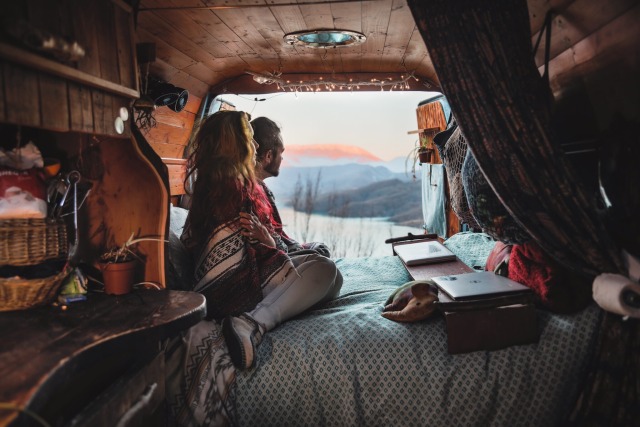
Over the years we’ve travelled our humble van’s back doors have framed a thousand views. They’ve shown us mountains, they’ve shown us shores; they’ve housed sunsets and sunrises, put on lightning shows and been blanketed in snow.
Hundreds of views, bordered by those strips of metal and wood, have passed beyond these doors like projector slides, temporary homes, our van the only constant as we go.
The view is our reward at the end of the day’s adventure; the more effort, the greater the prize. Adrift from civilisation, at the end of some nowhere dirt track, is where we can find the peace and solitude that we crave.⠀
We can become so overwhelmed by the vastness and beauty of what we’re seeing sometimes that our eyes become blind to it, but sitting from the comfort of our bed gazing out across the horizon has a way of grounding us and reminding us of where we are and how far we’ve come.
Like framing a photograph, sometimes all it takes is a little shift in perception to appreciate what’s been in front of you all along.


